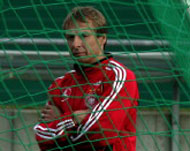History helps the hosts
Sitting in a Berlin chair, eating Bavarian cream Chris Wang takes a look at the pros and cons of home ground advantage at Germany 2006. We’ve all heard of it. Players lifting in front of their home fans. Referees giving favourable calls to the local side. A parochial

History shows that host nations of the World Cup Finals generally perform quite well.
Of the 17 completed tournaments, 6 hosts have become Champions with a further 2 as runner-up. That’s about half the host teams making it all the way to the final.
Further to this, 11 of 17 or 65% of hosts have made it to the semi finals, and a hefty 88% of World Cup hosting teams have reached the quarter finals stage. If Germany aren’t feeling the pressure to perform before their opening match in Munich, then perhaps they should be.
Cup conquests
Behind Brazil, Germany (mainly as West Germany), are the second most successful nation in World Cup history. They are three-time World Cup Champions and have been runner-up four times. They have topped their Round 1 group in the past four consecutive World Cup tournaments and are placed to do so again on home soil.
21 of the 23 players in the German squad play their club football in the German Bundesliga, with Jens Lehmann and Robert Huth both plying their trade in London. Coach Jurgen Klinsmann is a German icon amassing 108 caps and 47 goals for the national team.
|
|
|
Jurgen Klinsmann tangled up with |
Klinsmann was part of the West German World Cup winning side in 1990, and also played for Germany in the ’94 and ’98 tournaments. There is some serious footballing history here, and plenty of Deutsch pride in the national team.
With the flamboyance shown by their South American counterparts, the flair of the likes of Spain, Portugal and Holland, and the colour of the African participants, Germany’s tradesman like achievements are often glossed over.
A string of 1-0 results in the latter rounds of Japan/Korea 2002 were seen as boring and lucky wins, overshadowing an 8-0 drubbing of Saudi Arabia at the same tournament. Klinsmann has been at the German helm for just under two years, taking over in July 2004.
His tactics have drawn criticism from fans and the home press as he has selected teams based on performance rather than reputation, and has encouraged attacking football over the traditional defensive style.
Pressure
The squad is slowly gathering momentum under the former ‘Golden Bomber’, and a favourable first round draw plus home ground advantage sees Germany in line for another successful tournament.
Rather than feel the pressure of their own fans and media, the home team must harness the local support and thrive on it like many hosts have done before.
Football supporters are arguably the most fickle of all sports followers. It only takes a slight mistake by a player or a wrong move by the coach to turn the most ardent fan into a scathing critic.
All of this will be magnified for Germany as they tread their path to anticipated glory or unthinkable defeat in front of a populace of 82 million fans.
Argentina’s national side are known as Albicelestes, or ‘White and Sky blues’. Togo are Les Eperviers, ‘The Sparrow Hawks’. The Germans label their team Die Nationalelf – ‘The National Eleven’. The expectations of a World Cup host nation may have never been greater.
